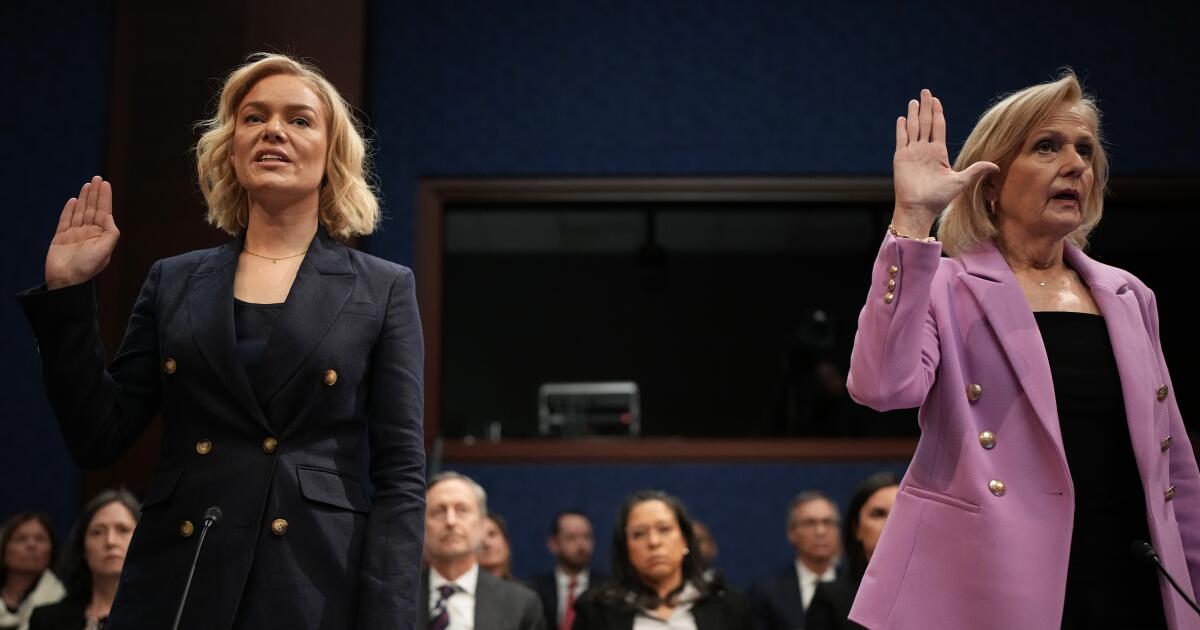The Senate voted to defund NPR and PBS. How will local stations cope?
Public media outlets around the country were preparing for the worst. Early Thursday morning, the worst arrived.
The U.S. Senate voted to approve the Trump White House’s proposal to claw back $9 billion in federal funding previously allocated for foreign aid and public broadcasting. The 51-48 Senate vote means that the Corp. for Public Broadcasting, which administers the funds for NPR radio stations and PBS TV affiliates, is on track to lose $1.1 billion that had been budgeted for the next two years.
The House of Representatives is expected to give final approval for the Trump administration’s request later Thursday.
The reaction from NPR was swift. The Washington, D.C.-based nonprofit has two major affiliates serving the Los Angeles area: LAist, or KPCC-FM (89.3), and KCRW-FM (89.9).
In a statement after the vote, NPR Chief Executive Katherine Maher warned of dire consequences for smaller communities that depend on public broadcasting outlets. “Nearly 3-in-4 Americans say they rely on their public radio stations for alerts and news for their public safety,” she said.”We call on the House of Representatives to reject this elimination of public media funding, which directly harms their communities and constituents, and could very well place lives at risk.”
PBS leaders sounded a similar alarm.
“These cuts will significantly impact all of our stations, but will be especially devastating to smaller stations and those serving large rural areas,” PBS President Paula Kerger said in a statement. “Many of our stations which provide access to free unique local programming and emergency alerts will now be forced to make hard decisions in the weeks and months ahead.”
PBS and NPR have both filed suit against President Trump and other administration officials over the president’s May executive order calling for the funding cutbacks. They say the order is a case of “viewpoint discrimination” driven by the White House’s unhappiness with the content of public media. Trump has called NPR and PBS government-funded “left-wing propaganda.” Republicans have for decades called for cuts to public broadcasting because of the perceived liberal slant of its programming.
Public media outlets in Southern California’s urban areas are less dependent on federal funding than stations in smaller, rural markets, which don’t get the same kinds of donations from wealthy locals, for example. But they will feel an immediate impact as the money TV and radio stations expected from Corp. for Public Broadcasting in October is now on the verge of disappearing.
Connie Leyva, executive director of KVCR Public Media in San Bernardino, which operates PBS and NPR affiliates, said earlier this week that the Senate action will mean losing $540,000, about 6% of its operating budget. Thus, she has to consider cutting five positions on an already lean staff.
In addition to serving the Inland Empire, KVCR operates a service called First Nations Experience (FNX), which produces programming for and about Native Americans and world Indigenous cultures. Such initiatives are endangered by the funding cuts.
“We just created an app, which is free to download and get Indigenous material wherever you are,” Leyva said. “But without funding, how do we continue to keep that relevant and fresh?”
Leyva said KVCR will likely have to reduce its block of PBS children’s TV programming that reaches her community through over-the-air antennas. “I heard one senator say, ‘You can have Disney or Nickelodeon,’” she said. “He doesn’t understand you have to purchase that. All of our programming is free, and these cuts harm our poor communities.”
LAist, based in Pasadena, was set to receive $1.7 million, about 4% of its annual budget. Alejandra Santamaria, president and chief executive of LAist, said the money is equivalent to 13 journalist positions at the local news operation.
“We have to make some tough choices,” Santamaria said.
Santamaria said the station has already reached out to donors to cover the expected shortfall. “We may not ever again get federal funding, so you have to fundraise the money to fill that gap in perpetuity,” she said.
Classical California, which operates radio stations KUSC-FM (91.5) in Los Angeles and KDFC-FM (90.3) in San Francisco, receive around $1 million annually in government funding. KCRW in Santa Monica, which produces tastemaking noncommercial music programs as well as news content, was expecting $264,000 from the CPB.

